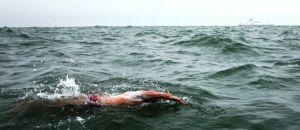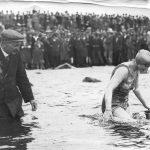When to test your limits, and when not to
There’s a motivational quote doing the rounds on Facebook at the moment that says something like: “You don’t know your limits until you have been pushed beyond them.”
It has a good ring to it and suggests that we limit ourselves through what we believe we can and can’t do rather than by going out and testing our limits to see what we can really do.
Powerful stuff, right?
I’ve spoken to English Channel swimmers who’ve adopted the idea that for a successful swim you start with the attitude that you will keep swimming until either you hit France or someone pulls you out of the water. It’s a trick for mentally removing your freedom to give in when you start to feel cold, tired or fed up – similar in a way to how Odysseus ordered his men to tie him to the ship’s mast to remove his freedom to follow the Sirens’ song.
Cold water swimmers do something similar. They set themselves goals and determine to keep swimming for a certain length of time or distance, regardless of how much it hurts.
While watching someone hit their physical limit can be incredibly moving and inspiring (think of Julie Moss in the 1982 Hawaii Ironman or Alistair Brownlee in London 2010) it’s also quite frightening.
Swimmers are almost certainly more at risk than triathletes if they reach the point where they can no longer physically or mentally function, either due to exhaustion or the effects of cold water, primarily because you can sink and drown and because you need to be extracted from the water before anyone can provide first aid.
An additional problem, it seems, is that your judgement is impaired if you become hypothermic, and you may not be fully aware how close to your limit you are.
To my mind this implies swimmers should exercise more caution than some other athletes when pushing their limits, whether it’s to do with distance, cold, rough water conditions or a combination of all three. If you hit your limit while swimming you will almost certainly need help to leave the water and perhaps dress and rewarm yourself. You should therefore only contemplate pushing this hard when you have the full support of the people you are relying on to help you if necessary.
On a Channel swim or during an official Ice Mile attempt this support will be there but during training it might not be and it’s selfish to assume that someone will pick up the pieces if you collapse.
Nobody wants to quit early and be labelled a wimp but it’s better than the possible alternative. Save the heroics for when you know you will be looked after.







